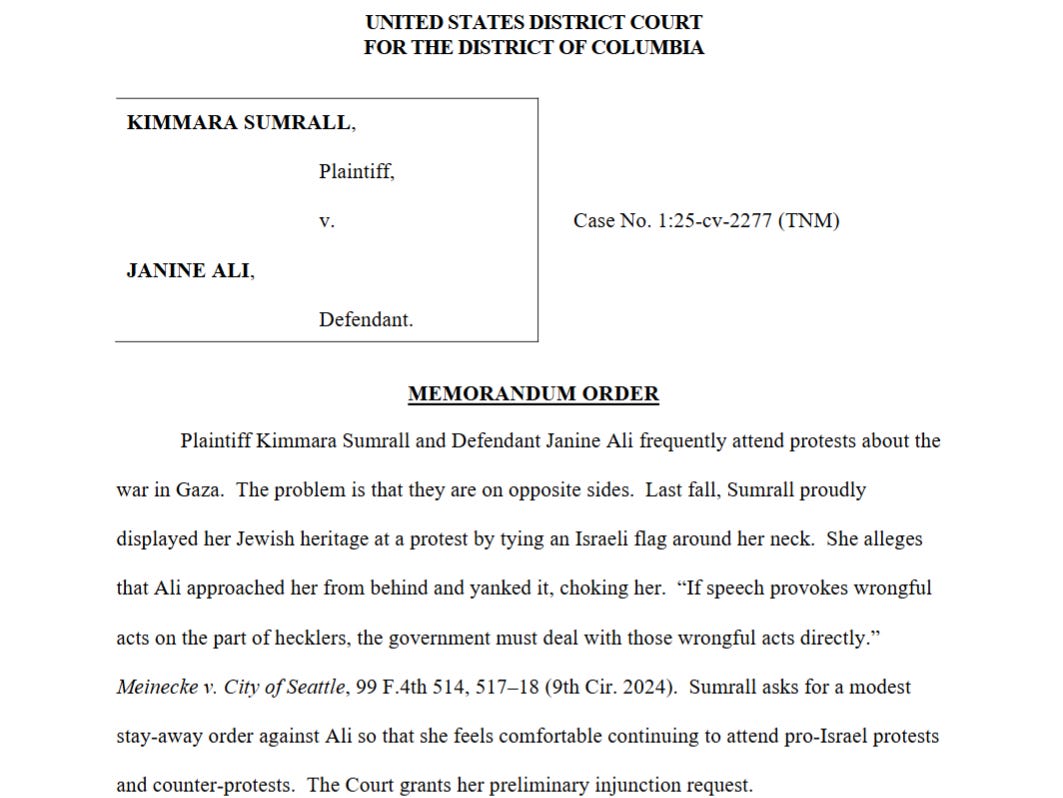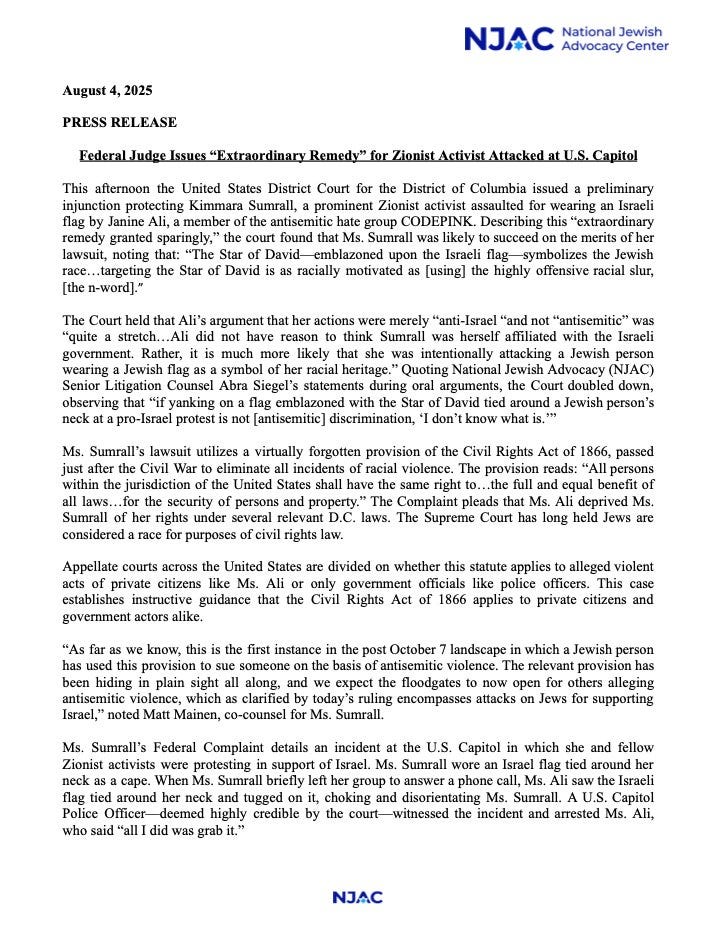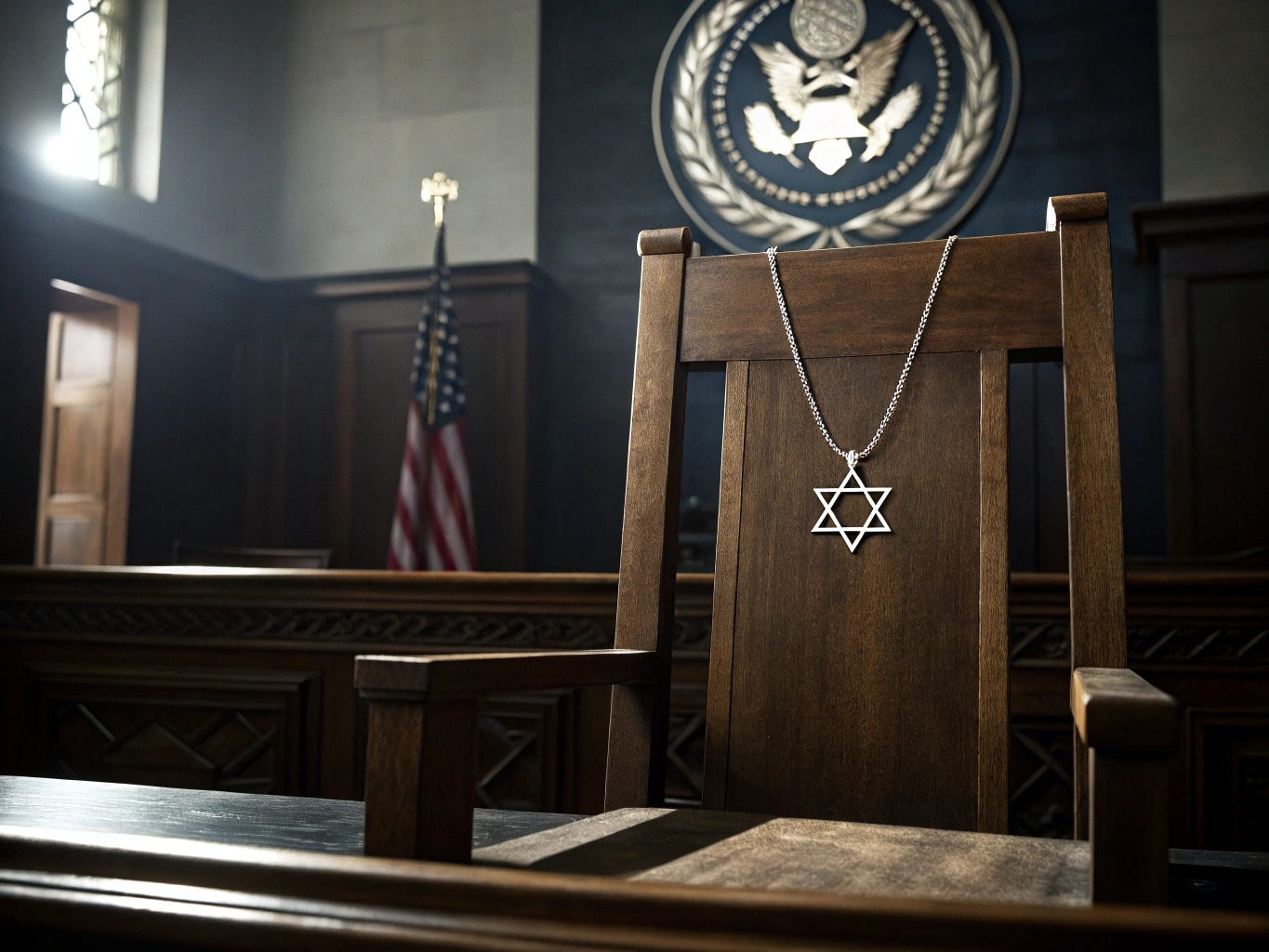Federal Judge Says Attacks on the Star of David Are Form of Racial Harassment
The judge wrote that the Star of David "symbolizes the Jewish race," marking a potential watershed moment for civil rights protections for Jewish Americans
On Monday, a federal judge wrote that targeting the Star of David is "as racially motivated as the highly offensive racial slur, [the N-word]," while granting protection to a Jewish activist who was allegedly choked when an aggressor yanked an Israeli flag from around her neck. The ruling — which could be a watershed moment for the American Jewish community — appears to be the first successful use of an 1866 Civil Rights Act provision to address post-October 7 antisemitic violence.
The United States District Court for the District of Columbia issued the preliminary injunction on August 4, 2025 in favor of Kimmara Sumrall, a Zionist activist, against Janine Ali, a member of the anti-Israel group CODEPINK. In a decision that could reshape how courts address antisemitic attacks, the judge found that "The Star of David—emblazoned upon the Israeli flag—symbolizes the Jewish race" and that Sumrall was likely to succeed in her lawsuit alleging racially motivated assault.
The court issued a stay-away order requiring Ali to maintain at least three yards distance from Sumrall in public and prohibiting all contact, after finding that the attack constituted "direct evidence of racial discrimination."

The Incident and Judicial Reasoning
The confrontation occurred on November 13, 2024, during a protest in the Dirksen Senate Building, where tensions ran high between pro-Israel and pro-Palestinian demonstrators. According to court documents, Sumrall was wearing an Israeli flag tied around her neck as a cape when Ali allegedly approached from behind and yanked it, causing Sumrall to be choked and her head jerked backward.
The court's most significant finding centered on the symbolic and racial significance of the attack. Rejecting Ali's argument that her actions were merely "anti-Israel" rather than antisemitic—which the judge called "quite a stretch"—the court established that targeting Jewish symbols constitutes racial discrimination at the highest level of offensiveness.
"Purposefully yanking on an Israeli flag tied around a Jewish person's neck to choke them is direct evidence of racial discrimination," the judge wrote, before making the comparison to the most inflammatory racial epithet in American discourse.
A U.S. Capitol Police Officer, Timothy Bonney, provided crucial testimony, stating he witnessed Ali "walk behind [Sumrall] and grab an Israeli flag that the victim had wrapped around her neck." Despite Ali's acquittal on criminal assault charges in D.C. Superior Court—where the burden of proof is "beyond a reasonable doubt"—the federal judge found sufficient evidence under the civil standard to support Sumrall's claims.
Legal Framework and Unprecedented Application
Matthew Mainen, an attorney representing Sumrall, emphasized the groundbreaking nature of the legal strategy. According to Mainen's analysis, this appears to be the first instance since October 7 where a Jewish person has successfully utilized this Civil Rights Act provision to address antisemitic violence. The lawsuit specifically argues that Ali's actions deprived Sumrall of her rights under several relevant D.C. laws, with the Supreme Court having long recognized Jews as a protected racial category under civil rights legislation.
Mainen described the Civil Rights Act provision as having been "hiding in plain sight all along," and predicted that the ruling could "open the floodgates" for other Jewish Americans seeking legal recourse against antisemitic violence, particularly when attackers claim to be targeting them for their pro-Israel beliefs, not their Jewish identity.
Organizational Analysis and Symbolic Recognition
Mark Goldfeder, CEO of the National Jewish Advocacy Center (NJAC), which supported the case, characterized the ruling as a "watershed moment" that reclaimed the historical significance of Jewish symbols. In his analysis, Goldfeder noted that the court's recognition of the Star of David as a racial symbol acknowledges what he described as a historical truth that "our enemies recognized long ago" during the Nazi era, but which Jewish Americans now "reclaim today with pride."
The NJAC's analysis emphasized how the multifaceted nature of Jewish identity—encompassing aspects of religion, race, culture, and nationality—often creates ambiguity that allows antisemitic acts to be excused or dismissed. According to their statement, this definitional complexity has contributed to increased rates of antisemitic incidents nationwide, as perpetrators exploit the vagueness to avoid accountability.
Goldfeder asserts that the court's equation of attacks on Jewish symbols with the most offensive racial language provides "crystal-clear example of moral clarity and common sense" that should guide other jurisdictions facing similar cases.

Constitutional Protections
Arielle Klepach, Senior Litigation Counsel at NJAC, emphasized that the ruling's significance extends beyond individual protection to fundamental First Amendment principles. Klepach suggests that by recognizing attacks on Jewish symbols as equivalent to the most severe forms of racial harassment, the court has established that Jewish Americans can exercise their constitutional rights to political expression without facing what amounts to racial violence.
The court's preliminary injunction represents what legal experts call an "extraordinary remedy granted sparingly," requiring demonstration of likelihood of success on the merits and irreparable harm. The judge found both standards met, noting Sumrall's credible testimony about ongoing fear and the chilling effect on her constitutional rights to participate in protests.
The stay-away order requires Ali to maintain at least 100 yards distance from Sumrall's home and workplace, and prohibits all forms of communication or contact, while allowing both parties to continue exercising their First Amendment rights to protest.
Precedential Impact for Post-October 7 Cases
Legal observers suggest this ruling could establish crucial precedent for addressing the documented surge in antisemitic incidents following the October 7, 2023 Hamas attack on Israel. The court's comparison of attacks on Jewish symbols to the most offensive racial language in American discourse could influence how prosecutors, judges, and civil rights attorneys approach similar cases nationwide.
The decision addresses a critical intersection in contemporary discourse: the relationship between anti-Israel sentiment and antisemitism. By finding that targeting the Star of David constitutes racial discrimination—even when framed as political opposition to Israel—the court established that Jewish symbols carry inherent racial significance transcending political contexts.
However, legal experts caution that while significant, this district court ruling's broader precedential impact will depend on how other federal courts interpret similar reasoning and whether appellate courts affirm the comparison. As the first major federal ruling to treat attacks on Jewish symbols as equivalent to severe racial harassment, it could potentially reshape civil rights litigation strategies for Jewish Americans facing discrimination.




This is awesome! We may not run the world, but if you make enough antisemitic noise we have plenty of lawyers to sue the shit out of you and take you house.